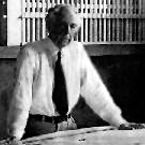Frank Lloyd Wright was born in Richland Center, Wisconsin in 1867. He and his family settled in Madison, Wisconsin in 1877.
He was educated at Second Ward School, Madison from 1879 to 1883.
After a brief sting at the University of Wisconsin where he took some mechanical drawing and basic mathematics courses, Wright departed for Chicago where he spent several months in J. L. Silsbee's office before seeking employment with Adler and Sullivan.
Wright evolved a new concept of interior space in architecture. Rejecting the existing view of rooms as single-function boxes, Wright created overlapping and interpenetrating rooms with shared spaces.
He designated use areas with screening devices and subtle changes in ceiling heights and created the idea of defined space as opposed to enclosed space.
Through experimentation, Wright developed the idea of the prairie house - a long, low building with hovering planes and horizontal emphasis. He developed these houses around the basic crucifix, L or T shape and utilized a basic unit system of organization.
He integrated simple materials such as brick, wood, and plaster into the designs. In 1914 Wright lost his wife and several members of his household when a servant burned down Taliesin, his home and studio in Wisconsin. Following the tragedy, he re-directed his architecture toward more solid, protective forms.
Although he produced few works during the 1920s, Wright theoretically began moving in a new direction that would lead to some of his greatest works. Walter Burley Griffin was among the many notable architects to emerge from the Wright studios. In 1932 Wright established the Taliesin Fellowship - a group of apprentices who did construction work, domestic chores, and design studies. Four years later, he designed and built both Fallingwater and the Johnson Administration Building.
These designs re-invigorated Wright's career and led to a steady flow of commissions, particularly for lower middle income housing. Wright responded to the need for low income housing with the Usonian house, a development from his earlier prairie house.
During the last part of his life, Wright produced a wide range of work. Particularly important was Taliesin West, a winter retreat and studio he built in Phoenix, Arizona. He died at Taliesin West in 1959.
